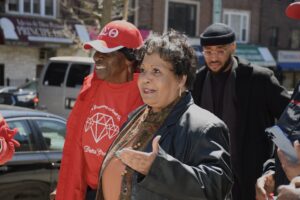Reena Evers-Everette brings ‘The Power of a Black Woman’ to Medgar Evers College
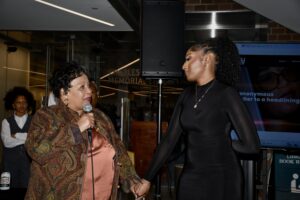
By David Gil de Rubio | dgilderubio@mec.cuny.edu
When Reena Evers-Everette arrived in the lobby of Medgar Evers College, the school that bears the name of her iconic civil rights activist father, a robust group of students greeted her.
Pivoting from celebrating the launch of the school’s TikTok channel, the enthusiasm from this throng of young people put a smile on Evers-Everette’s face.
Adding to her delight was the gift of verse from lower senior Fatima Ndiaye, who read a poem she penned called “The Power of a Black Woman.” With couplets nodding to strength, resilience, wisdom and beauty, Ndiaye’s words perfectly described the jovial guest of honor, who was returning the following day.
Her visit was a teaser for the sold-out Daughters of the Legacy, an event set to feature Evers-Everette alongside longtime friend Dr. Ilyasah Shabazz, daughter of Malcolm X and former Medgar Evers College professor, Dr. Betty Shabazz.
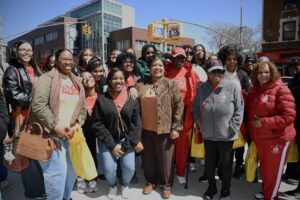
The day’s event also found Evers-Everette doing one of her favorite parts of advocacy — engaging with young people. In this case, it was a class led by Dr. Lystra Huggins, Dr. Jane Alexander and Sherill-Ann Mason and consisting of pupils from the ASAP, SEEK and freshmen programs.
As a means of breaking the ice, she had the students stand up, state their names and why they were at Medgar Evers College.
For some like Anaya Kearse, it was on the recommendation of a family member (“My mom, Karen came here and told me about this amazing community at the school. I wanted that too, so I came here.”) For Annette Edgar, who is a proud grandmother and member of ASAP, it was to earn a degree in education. (“My passion is special education and am so happy to be here. I feel like it’s best program in the whole of CUNY, so I really appreciate that.”)
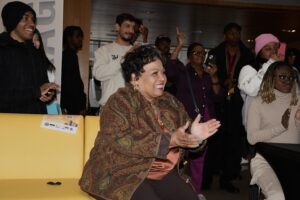
By the time every student was done with this exercise, Evers-Everette spent the remaining time imparting personal insights and dispensing pearls of wisdom. Warmth and love emanated from Evers-Everette as she shared memories of her father, who was assassinated on June 12, 1963.She didn’t shirk away from bringing up his tragic passing, but also made sure to stress to students the importance of not just learning about her father, but the importance of what he was fighting for.
“[Medgar Evers College] has always been wanting to hold my father up,” Evers-Everette said. “What I ask of you as a daughter is to learn as much as you can that’s out there about the man. I know in the freshman year, you get taught. But glean something from whatever you’ve gotten and see how it applies in your life. Especially now. There’s a lot that he’s done and did and so many others that have been assassinated or passed on.”
She added, “There are many rights that people fought for, died for and were put in place for humans. Civil rights and human rights are being destroyed. That’s what dad—Medgar Wiley Evers—fought for, drove for and died for. So please, for me, my mother—really look at who the man is because he’s still here. He’s still here because you’re here. And he’s going to carry on through you.”
During a post-class conversation, Evers-Everette opened up more about her father. And while he might be a name in a history book, his daughter humanized his roles as a family man and staunch community member. Despite the danger looming from outside threats, the Mississippi native made it clear how love was the overwhelming mood in her house. All this even as her father balanced his private and public lives.
“It was a family-filled time where we had not a care in the world, except for when we got older, knowing about the threats,” she said. “We enjoyed the so-called ‘normal’ in a child’s eyes. You got to play. You got to go to school. You got to eat, come home, enjoy. And go to church. The difference for our family was understanding that we had to be careful where we sat. We had to be careful with understanding who was around us and had to know and decide what was the best place in the house to be safe.”
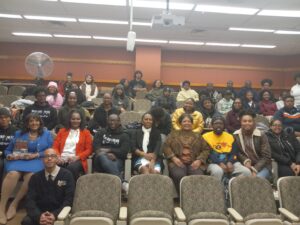
She added, “While we had a lot of love in our family, it wasn’t fun when we would have dinner and would have to be quiet all the time. And if we even tried to ask for anything on the table, it was, ‘Hush,’ because my father was intent on listening to every single thing that came out of the news—everything. We knew that was important and we knew his work was connected to that and the people he brought home as well as when we went out to his office. I wanted to go to jail with my father. And my mother wouldn’t let me. I was quite upset—I always wanted to be with Dad.”
The most touching insight Evers-Everette shared was the lighthearted and fun vibe her father gave off, even as death threats loomed. Most telling were the interactions he had with the neighborhood children who eagerly greeted him whenever he returned home from work or the many advocacy trips he was constantly on.
“My father was the Pied Piper of the neighborhood,” she recalled with a laugh. “As soon as his car drove up, everybody was calling, ‘Mr. Evers, Mr. Evers, come over and play. I’ll race you up the street.’ He would always let them start early, but he would end up beating them of course.”
That connection with young people was something Medgar Evers embraced early on. As she mentioned earlier in the class, it was because, “…of their knowledge, their courage and their strength. And also because of their resilience, thirst for knowledge and desire to get things right.” As for what she wants attendees of the Daughters of the Legacy to come away with after the event is over? It’s about picking up the mantle left behind by not only her father, but Malcolm X and anyone who has fought for societal gains.
“The call to action is to actually come together and fight for our civil, human and equal rights,” Evers-Everette said. “As I said in the classroom, so many people from 200-plus years ago fought and lost their lives. People say my father gave his life. My father gave his life to the mission of equal justice, equality and rights. He didn’t give it to die. He was living what his purpose was. It was taken away from us and it was taken away from him.”
When asked about the importance of Medgar Evers College, Evers-Everette finished up by pointing to the importance of civic engagement.
“On a very personal basis, the reason I think [the community] fought to have my father’s name established was to not let his legacy die and because of what was said in the classroom,” she said. “To stop what you’re doing, take an amount of time and really understand what’s going on in this world. Not on your block. Not just in your college. What’s going on in this world. What’s so important about learning what the daughters are saying is that we’ve lived this and it’s coming back a lot faster than we ever thought it would. This school — this university — calls to the youth that he always wanted to empower in answering the call of equal rights for all.
“Because they knew that they had the power to move it forward and make the world a better place.”
